Rowing Gold Medalist Leaves Iran For Azerbaijan
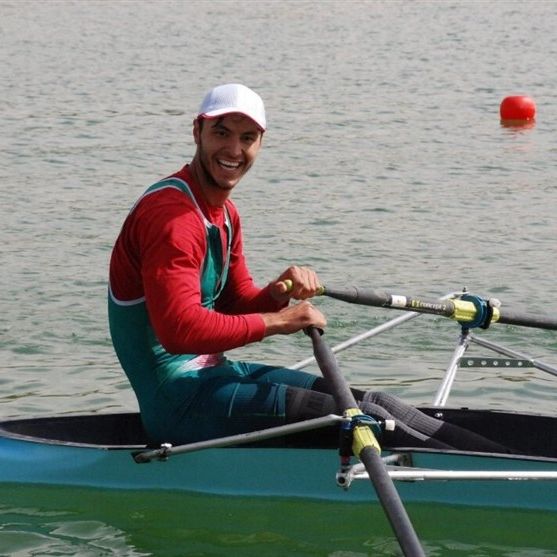
Iranian rowing Asian gold medalist Bahman Nasiri has left the national team as he emigrated to the Republic of Azerbaijan.

Iranian rowing Asian gold medalist Bahman Nasiri has left the national team as he emigrated to the Republic of Azerbaijan.
The head of Iran’s canoeing and rowing federation, Alireza Sohrabian, said on Saturday that Nasiri wanted to be employed by the federation, but it didn’t happen, making him leave the team.
He had left Iran before but returned to the country following promises by authorities.
Nasiri had pocketed a gold medal for the Islamic Republic in men’s single scull and a bronze in quad sculls category at the 2019 Asian Rowing Cup.
It is not yet clear whether he will be representing Azerbaijan in international competitions.
About 30 Iranian athletes in recent years have defected from Iranian national teams and sought asylum in other countries, including Judo champion Saeid Mollaei, Greco-Roman national team wrestler Ali Arsalan, and many others, due to a lack of attention, threats and corruption in their federations as well as Iran’s policy of not allowing athlete to compete against Israel. For women mandatory hijab is also an issue.
Also on Saturday, judoka Mohammad Rashnonezhad, another Iranian judo champion who left the country, played against an Israeli opponent as a member of the refugees’ team of International Judo Federation, something he couldn’t do as an Iranian athlete.
Last week, karate champion Sajjad Ganjzadeh criticized the Islamic Republic for not allowing athletes to play matches against Israeli competitors, saying, "We cannot tolerate this anymore. Not competing is more difficult than competing”.
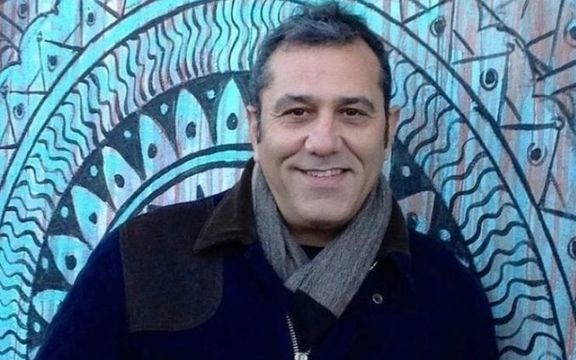
US Secretary of State Antony Blinken has called on the Iran to release US Iranian dual national Emad Sharghi and stop its policy of holding people as political pawns.
In a tweet on Saturday, Blinken said, “For four years, the Shargi (Sharghi) family has waited anxiously for the Iranian government to release Emad”.
Calling on Iran to stop this “inhumane practice” and release Emad, he added that “Like too many other families, their loved one has been treated as a political pawn”.
Earlier in the day, Special Envoy for Iran Robert Malley also called for his release, saying, “Shargi was arrested 4 years ago today. He was cleared of all charges, but then convicted in absentia, rearrested, and has now spent over 500 days in Evin Prison”.
“Emad, the Namazis, and Morad Tahbaz must all be allowed to come home now”, Malley added.
On Friday, Republican Senator Marco Rubio twitted for the release of Sharghi, noting that he remains unjustly detained in the notorious Evin Prison under false charges.
The 56-year-old businessman was arrested on December 6, 2020. According to reports, he has been sentenced to ten years in prison on charges of espionage and collecting military intelligence but had attempted to flee while on bail awaiting the result of an appeal.
Foreign governments and human rights organizations have accused Iran of detaining foreigners and dual nationals on trumped up charges to use them for getting concessions from Western countries.
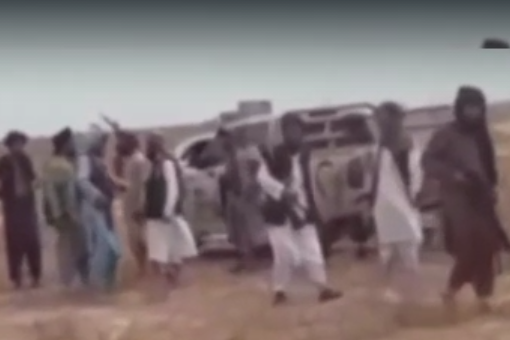
Tehran says the Taliban's "uncoordinated" road construction at the Dogharoon-Islam Qala border area caused border tensions on Saturday.
Hasan Kazemi-Qomi, President Ebrahim Raisi's special envoy for Afghanistan, told the Revolutionary Guards (IRGC) linked Fars news agency that the Taliban border guards had violated Iran’s territory and the Iranian side had stopped their activities and this gave rise to tension in the border area.
Kazemi Qomi said Tehran had contacted the Taliban interior and defense ministries and stressed that all construction had to be stopped and the dispute needed be resolved by a joint commission.
Iran state television quoted the commander of Iran's border guard regiment in the area, Colonel Mohammad Cheragh, as saying that the matter would be settled by "experts" from both sides and that the situation was calm in the border areas.
Unconfirmed reports by Afghan sources said earlier on Saturday that five Iranian border guards had been detained after they tried to stop the Taliban from laying asphalt on a road in the border area.
Clashes were also reported between Iranian border guards and the Taliban in early December.

Ajmal Omar Shinwari, a former spokesman of Afghan Armed Forces, on Saturday told Iran International TV's Afghan channel that the Taliban do not have control over all their forces some of whom have no proper military training and that the actions of some groups from among the Taliban could cause the country's neighbors to feel danger.
The Islamic Republic first welcomed the Taliban victory in August 2021, presenting it as a defeat for the United States, but terror attacks against Shiite Afghans later led to protests in Iran and warnings from Tehran that the Taliban must protect minorities. Iran has also been demanding an inclusive government in Afghanistan, while the Taliban have kept their tight control.
In early April tensions rose between Iran and the Taliban over Afghan protesters' attack on the Iranian consulate in Herat which led to a halt in Iran's consular services in the country. Iran's Revolutionary Guards (IRGC) linked Tasnim news agency alleged that "western-backed" political groups were behind the attack on the Iranian consulate.
Iranian officials have condemned Friday's blast at the Mawlavi Sekandar Sunni Mosque in the northern Afghan city of Kunduz, as well as Thursday's attack at a Shia Mosque in Mazar-e Sharif, also in northern Afghanistan, for which Daesh claimed responsibility. No one has taken responsibility for the attack on the Sunni Mosque yet.
President Ebrahim Raisi said Saturday that the "current rulers of Afghanistan (Taliban)" have a responsibility to protect the lives of Muslims and take action against "rogue elements who viciously target ordinary people and public security" in Afghanistan. In the same speech, he called Daesh "the offspring of Western spy services and the Israeli regime."
Iranian Foreign Ministry Spokesman Saeed Khatibzadeh on Friday expressed deep concern over the recent terrorist attacks in Afghanistan. The attack on the Sunni Mosque in Kunduz following one on a Shiite Mosque in Mazar-i-Sharif, clearly shows the "evil goals of the terrorists serving as mercenaries for foreigners", he said, adding that they seek to "create a civil war in Afghanistan.”
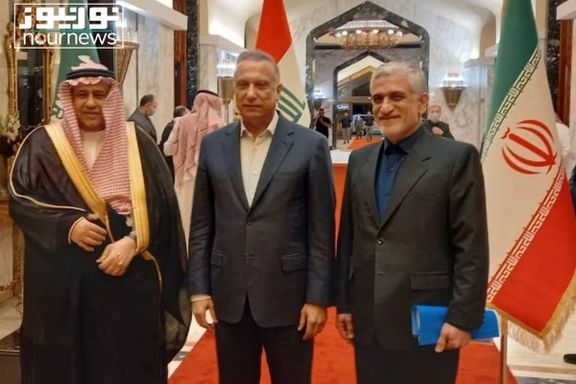
Iran and Saudi Arabia have finally held the much-anticipated fifth round of bilateral negotiations in the Iraqi capital Baghdad.
According to Nour News, a website affiliated with the secretary of Iran's Supreme National Security Council (SNSC), Ali Shamkhani, said on Saturday that in this round a clear outlook was reached for the resumption of regular talks.
Describing the meeting as positive, Nour News said that this latest round raised hopes for re-establishing official relations between Tehran and Riyadh.
The report didn’t mention who participated in the talks and when exactly they took place but published a photo of Shamkhani’s deputy Saeed Iravani and head of the Saudi intelligence service Khalid bin Ali Al Humaidan, who apparently represented the two countries, saying this round “paved the grounds for a meeting between the Iranian and Saudi ministers in the near future”.
It added that high-ranking Iraqi and Omani officials have played an important role in organizing the meeting between representatives of Tehran and Riyadh.
Iran’s Foreign Ministry spokesman attending an Islamic gathering late in March said improving Tehran-Riyadh relations would benefit all regional countries.
However, it was the Islamic Republic that earlier in the month suspended the talks a day after Saudi Arabia announced it had beheaded 81 men, including seven Yemenis and a Syrian, for “heinous crimes.” Forty-one were Saudi Shiites, Human Rights Watch reported, apparently convicted over protests.
Sunni Muslim Saudi Arabia and Shiite Iran, which are locked in proxy conflicts around the region, launched direct talks hosted by Iraq last year.
Saudi Arabia cut ties with Iran in 2016 when mobs attacked its embassy in Tehran after Riyadh executed 47 dissidents including the leading Shiite cleric Sheikh Nimr al-Nimr.
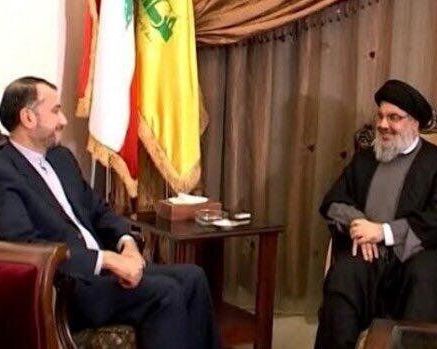
Saudi Arabian daily Okaz says that Iran-backed Lebanese Hezbollah has asked Iran for $25 million in addition to the annual funds it receives from Tehran.
Okaz cited informed sourcesas saying on Wednesday that the extra funds may be spent to finance the group’s activities for parliamentary elections in Lebanon, which will be held next month.
According to the unnamed sources, Hezbollah asked Supreme Leader Ali Khamenei’s office to make its utmost efforts to secure a minimum amount of $25 million in addition to the annual budget it receives from Iran, noting that this amount will be allocated to finance media campaigns for personalities and parties allied with the Shiite group that wants to preserve its considerable influence in Lebanese politics.
The sources said Hezbollah understands the difficult economic situation in Iran as the nuclear agreement has not yet been signed and Iranian funds frozen in banks are not released but said that strengthening its own and Iran’s political position in Lebanon is worth the funding.
Lebanese media say the latest visit by Iran’s foreign minister to Beirut was also related to this request by Hezbollah.
Hossein Amir-Abdollahian travelled to Lebanon late in March to bolster relations with senior Lebanese authorities.
During his visit, Amir-Abdollahian met with President Michel Aoun, Parliament Speaker Nabih Berri, Prime Minister Najib Mikati, and Foreign Minister Abdallah Bou Habib.
Late in 2021, a large group of Lebanese politicians established a new opposition group to end what they call Iranian occupation of Lebanon represented through Hezbollah.
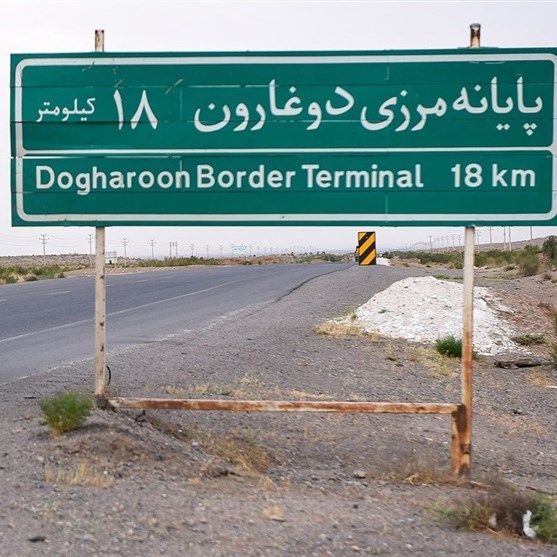
Following a “dispute” between Iranian and Afghan border guards on Saturday, a border crossing was temporarily shut down, Iranian media reported.
Tasnim news agency close to Iran’s Revolutionary Guard said that apparently the disagreement between the two sides emerged when the Taliban wanted to build a road near the border crossing Dogharoon but denied reports about clashes. Tasnim said that Iranian forces and representatives of the Taliban were trying to defuse the situation.
However, the agency also said that cargos at Dogharoon crossing has been moved to a safer distance as precaution.
A video on social media shows an Iranian military vehicle seized by the Taliban as six Iranian border guards are seen standing nearby. A local Taliban official confirmed the seizure, saying the vehicle had entered Afghanistan, Tolo News in Kabul reported.
Some Afghan citizens reported on social media that the reason for the border tension was an attempt by Iran to build two observation posts and a road.
There have been some incidents at the border since the Taliban seized control of Afghanistan last year. An Iranian foreign ministry official in January said that the reason for an earlier incident of clashes between Iranian forces and the Taliban was lack of professional conduct by the latter.